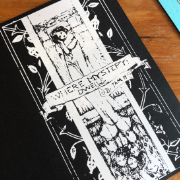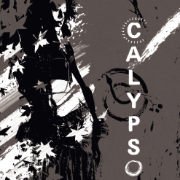Interpretive Actors

filed under pythia on 18 Apr 2017 tagged solo, pythia, tutorial, and actor
Just a post to show off how I’ve been generating actors lately in Pythia. The very nice thing about using a program is it’s very easy to change up your methods if something isn’t working, or to generate a new result if the first (or tenth) isn’t really catching your imagination.
This is from a test of Calypso I ran recently, using the Darkness Falls scenario and entirely on the fly. It’s system agnostic, though.
I knew literally nothing about this character except that they were probably working for the enemy.
[Gender Appearance] female
Pretty self-explanatory. Push button, get back “male” or “female”. I tend to use this as “what does my hero assume about them from their appearance” and use an oracle to get more information later if I need it.
[Visible Quirk] gap in front teeth
[Visible Quirk] looking down
A couple of visible quirks; things my character will spot right from the get-go. Things I can incorporate into the character’s introduction to the stage, that give me a clue to what she’s doing. There’s a huge list of these in Pythia and range from physical details to demeanor to clothing to things they might be carrying.
In this case, it was easy to decide she’s cute in a tomboyish kind of way and either not paying attention to her surroundings or dejected. I went with the former; she was actively trying to shut a door and not looking around in the process.
[Non-Visible Quirk] openly prejudiced
The non-visible quirk I sometimes roll up right away, but not always. Knowing up front gives me more material to work with. Sometimes it’ll never really come up, but it will inform the details and description.
It was too early to know what she was prejudiced against, though the easiest and most immediately interesting answer is “whatever group the hero belongs to”.
[Wheel]
[Mild] submissive, [driving] hope
[Focus] wrong
This is a general outlook; one or more subjects like “art”, “money”, “family”, and so on, and one or more attitudes towards those subjects, along with a degree of intensity.
It’s useful mainly for getting the overal “gist” of the character; in this case the character feels mildly submissive towards “wrong”, with a driving hope for it as well. I interpreted “wrong” as the villain and his actions, and that she was willing to go along with his schemes as long as she had hope he might change. Her main flaw, it seems, is going to be idealism shading into wishful thinking.
[Goals]
[Mild] to achieve success [my enemy]
[Driving] to deceive for personal gain [my hero]
These are her immediate goals, each given a degree of urgency and a possible actor hook. This is simple to interpret – she wants the villain to succeed but her immediate need is to deceive the hero. About her true allegiance, likely.
[Focused] Actor acts in accordance with their current desire.
This is the last piece of the puzzle – what’s the actor going to do next? In this case, I ended up playing a bit before I figured out what her current desire was, and then she acted on it.
And that’s about it for my “standard” actor generation. Sometimes I’ll generate up an age, too, if there’s no compelling reason to fiat it.
There are quite a few more tools in Pythia on the actor panel, all of which should (unless I failed at my documentation check or something) be documented well in the help. But here’s a few more I use frequently.
Once things get going and I have more actors to work with, I’ll start using the relationship generators. There’s a “close” relationship button, useful for people who are in constant proximity or at least constantly affecting each other.
The first actor opposes every goal of the second actor and expresses this covertly and passively.
Easy to decode, huh? The first guy is secretly sabotaging the second’s goals, but hasn’t taken any really aggressive action yet.
There’s a specialized one for actor’s feeling towards a group and one for more general relationships, where the target is a place or thing or abstract concept, or a close and complicated relationship isn’t assumed or necessary.
The actor wants but doesn't need the target.
I’ll also often use the reaction generators. First I determine if the actor has a positive or negative reaction to something that’s happened or to my hero (which varies by system), then hit the corresponding button in Pythia.
[Reaction] Annoyance [strong] hidden by amusement [strong]
It’s a bit like the wheel, but where that’s geared more towards general outlook, this is more immediate and short-term. It’s also handy when the hero asks an actor a question and you want the answer to be a surprise to you, too!
Of course, everything’s interpreted, so there’s no right or wrong. I usually just go with my gut instinct or first thought and it seems to work out well. It definitely takes a lot longer to detail it and explain the thought processes than it takes to actually create the actor in play!


